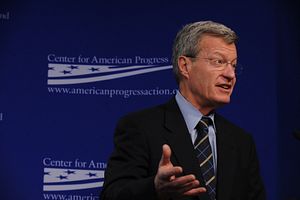The U.S. Senate voted unanimously to confirm Senator Max Baucus (D-MT) as the new U.S. Ambassador to China. Baucus will be quickly sworn in as the ambassador, according to the Wall Street Journal.
The Senate approved the nomination by a vote of 96-0, indicating the deep support for the nominee, which was expected given Baucus’s long career in the Senate. However, the pace by which the nomination made its way through the legislative process was remarkable. President Obama nominated Baucus to be ambassador to China on December 19. His hearing before the Senate Foreign Relations Committee took place just last week.
By way of comparison, reports that Caroline Kennedy would be the next ambassador to Japan emerged in April of last year. She was officially nominated in July and wasn’t confirmed by the full Senate until the middle of October, about a month after she appeared before the Senate Foreign Relations Committee.
Baucus’s nomination took even people on Capitol Hill by surprise, yet he has now been confirmed just a month and a half later. The quick confirmation process could reflect the desire of both political parties to start what will be a close election to fill his Senate seat. It could also be a measure of the growing concern among U.S. officials and lawmakers about China’s recent assertiveness in its maritime disputes in the East and South China Seas.
This newfound concern was on full display during Baucus’s confirmation hearing last week. Senator and potential presidential candidate Marco Rubio (R-FL) stated: “I think if the Chinese are willing to use their newfound economic and even military abilities to be a productive member of the global community… I think that would be an extraordinary development for mankind. If, on the other hand, this newfound power is used to turn their neighbors into tributary states and to continue to oppress people within their own country, I think we have a big problem and a major, major challenge.” (Rubio also somewhat bizarrely urged Baucus to attend a “worship service at an unregistered Catholic or Protestant church within China.”)
Senator John McCain (R-AZ) expressed even more alarm about the rise of Chinese power and its growing assertiveness. Noting that he was somewhat concerned by Baucus’ characterizing China’s recent diplomatic posture as being driven by national pride, McCain explained, “So we have to understand that this isn’t a matter of they’re proud as we are proud. This isn’t a matter of they want to keep their job. This is a matter of a rising threat — or challenge to peace and security in Asia because of the profound belief on the Chinese leadership that China must and will regain the dominant role that they had for a couple of thousand years in Asia. And unless you understand that, you’re going to have trouble dealing with them. You’re going to have — well, you’re going to have trouble dealing with them effectively.”
McCain also warned, “And the fact is that the South China Sea has implications which could lead to another ‘Guns of August.’ And their aggressive behavior, whether it be a near collision with a United States ship or whether imposition of the ADIZ or whether it be many of the other actions they have taken are part of a pattern of their ambition to dominate that part of the world.” The senior senator from Arizona then recommended that Baucus talk to Lee Kuan Yew, the Singaporean senior statesmen, as well as “check in” with Henry Kissinger.
It’s unclear how capable Baucus will be in handling these geopolitical issues. During his over three decades on Capitol Hill, Baucus was primarily known for his work on finance and trade issues, including with China. Baucus’ opening statement to the Senate Foreign Relations Committee was also heavy on economic and trade issues. The former Montana senator said that his first “overarching goal” in Beijing would be “to develop our economic relationship with China in a way that benefits American businesses and workers.” He also referred to himself as a “firm believer that a strong geopolitical relationship can be born out of a strong economic relationship, which often begins with trade.” The view that growing trade with China would dampen geopolitical tensions was widely held in Washington for decades, but has largely fallen out of favor in recent years.
Some senators implied during the confirmation hearing that they were somewhat uneasy about Baucus’ lack of experience with geopolitical issues. Besides McCain’s testimony, in asking about China’s establishment of an Air Defense Identification Zone in the East China Sea, Senator Bob Corker (R-TN) commented that “I know it’s an area that’s been outside, generally speaking, of the great trade issues and other kind of things you pursued in Finance.”
China appears to have its own concerns about the prospect of Baucus’ ambassadorship. While saying that “China welcomes the coming of Baucus,” an Xinhua article on Friday noted that being U.S. ambassador to China will be “no picnic.” The article went on to express concern that “Baucus has also adopted a hard line against China’s trade practices and currency exchange rate.” Xinhua did, however, offer some advice: “The first thing Baucus could do when he arrives in Beijing is to pick off his colored glasses on China’s economy and learn more about the complexity of bilateral relations.”

































